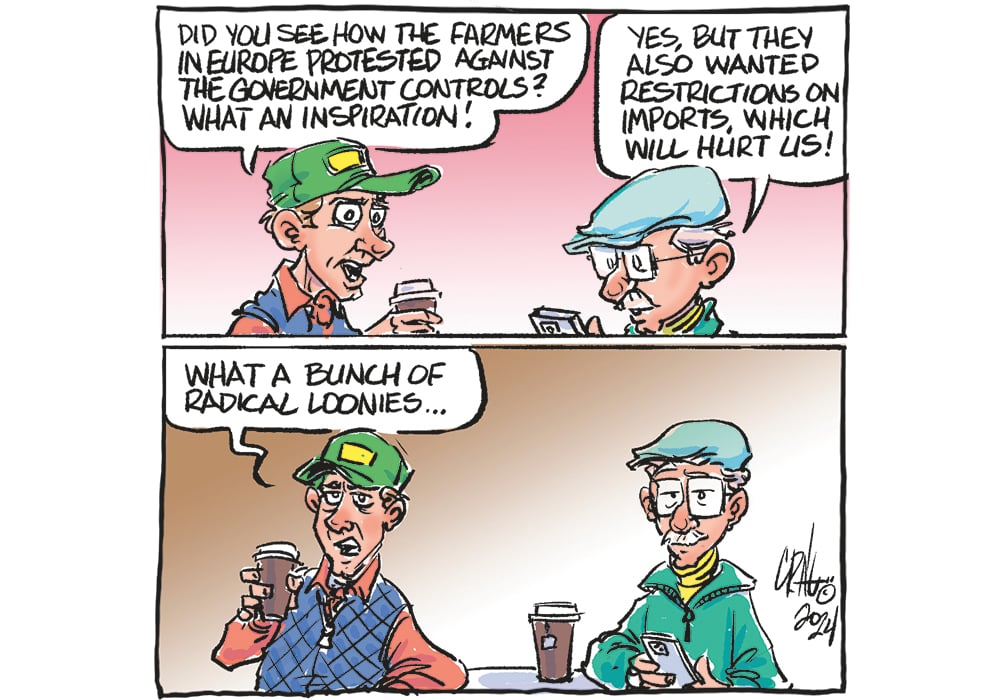During his defence of Donald Trump on page 14 of the Feb. 1 issue of The Western Producer, Robert Arnason accepts what his brother-in-law and the rest of the world knows — Trump is a court-established rapist, fraudster and conman who is “immoral and deranged.” The remainder of Arnason’s piece is simply making excuses for Trump by claiming that the political left is the cause.
Trump and his followers do not have a lot in common. Most followers are not criminals, but they are intrigued by his style, unpredictability and lack of conformity.
Read Also
EU farmer demands don’t all favour Canada
Canadian farmers may watch what’s happening on the streets of Europe this winter with a mixture of envy and admiration….
Trump the conman simply realized early on that he could tap into a deep sense of victimization that was not being addressed by other political forces. So he quickly moved from pretending to be a super-rich property developer on TV to playing the victim and repeating phrases like “I’m just like you” and “I love the uneducated” in order to get in front of a movement of people that were feeling increasingly isolated and demoted within society.
The sense of loss/victimhood that Trump exploits in his followers is deep and real, and it does have something to do with left-wing policies — just not Arnason’s understanding — and it’s important to explore this further.
The improvements in living standards have overwhelmingly occurred within the last 100 years directly as a result of left-wing policies.
Before that, regular folk had little or no chance of rising above their station in life. The feudal system with its own version of “caste” was firmly in place. For the overwhelming majority of people, life was, in fact, “nasty, brutish, and short.”
But then unions, co-ops and functioning democracies showed the way to modest increases in living standards, and people started to feel they could control their own destinies.
This sense of optimism and empowerment greatly increased with the gains made through left-wing policies between 1900 and 1980. Canada and the United States adopted these policies and fostered a much better life for the vast majority of people.
For example, publicly funded education became mandatory, which greatly increased the opportunities for young people and helped lead to the abolition of child labour.
The Amalgamated Clothing Workers of America Union gained the first five-day workweek in 1929, thereby creating the weekend that everyone now takes for granted.
Comprehensive medical care in Canada started in 1962 in Saskatchewan, and the Canada Pension Plan was created in 1965.
The Western Producer itself was created by the revolutionary left-wing policy that created Saskatchewan Wheat Pool in 1923, and the Producer is still living off the fumes of those times.
These New Deal/left-wing policies, and hundreds more just like them, were a process of great awakening and mobilization of humble people understanding how to make a better life for themselves and their children.
In the years between 1946 and 1978, the standard of living in Canada and the U.S. more than doubled, and by 1980 North America enjoyed the highest standard of living in the industrialized world.
Left-wing policies had in fact created a sense of importance, place and opportunity for regular folks — farmers included. In Canada, 1976 recorded the highest ever net income from the markets for Canadian farmers.
But in the last 40 years most of those gains have been greatly eroded. Employment standards and real wages have fallen — several states in the U.S. are now encouraging child labour in industries like beef packing. Public education and medical care are under constant attack.
Families that rose to those higher standards of living in the 1970s have seen their jobs deteriorate from white or blue-collar jobs to part-time jobs without security or pensions.
Housing then becomes unaffordable, the part-time jobs can’t pay for a car good enough to get them to work and documented greedflation by corporate retailers takes extra cash from both farmers and consumers.
And now we are starting to experience climateflation, wherein food production becomes unstable due to global heating in agricultural areas. The climate meltdown is not a left-wing or right- wing problem, but so far only the left wing seems willing to talk about it. Cascading crop failures will make current food prices seem very low.
In short, millions of people in North America can feel the ground shifting under their feet, and they are no longer confident of their place in the world. The prospects for their kids don’t seem as rosy as their own were 30 years ago.
As well, a sense of “let’s just burn it all down” is amplified by destructive politicians like Trump who are more than willing to throw gas on any fire.
No governments in North America have regained the ground lost over the last 40 years. So-called left-wing governments since the 1990s have simply shadowed the right-wing political forces in their shift to an even more extreme right.
The prime directive of governments has shifted from lifting people up to guaranteeing profits for big business, whether that happens to be seed development and ownership, starving education in favour of tax cuts for industry or killing medicare in order to pave the way for re-privatization.
It is, in fact, the right-wing policies of the last 40 years that prepared the groundwork for Trump. Deregulation, industry self-regulation, industry capture of government agencies, corporate consolidation, obscene executive compensation and climate collapse all cause people to lose hope for the future.
Scapegoating left-wing policies is just another fraud perpetrated on a nervous public.
Stewart Wells farms at Swift Current, Sask.
